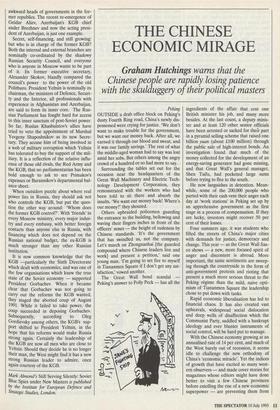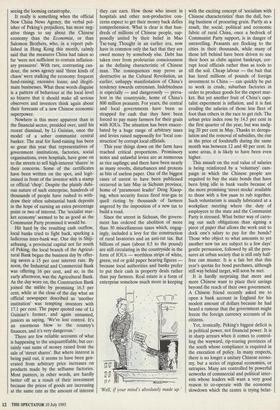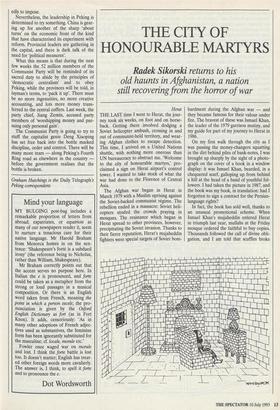THE CHINESE ECONOMIC MIRAGE
Graham Hutchings warns that the
Chinese people are rapidly losing patience with the skulduggery of their political masters
Peking OUTSIDE a drab office block on Peking's dusty Fourth Ring road, China's newly dis- possessed were crying for justice. 'We don't want to make trouble for the government, but we want our money back. After all, we earned it through our blood and sweat, and it was our family savings.' The rest of what the middle-aged woman had to say was lost amid her sobs. But others among the angry crowd of a hundred or so had more to say.
Surrounding the tables set out for the occasion near the headquarters of the Great Wall Machinery and Electric Tech- nology Development Corporation, they remonstrated with the workers who had been told to sit there and absorb the insults. 'We want our money back! Where's our money?' they shouted. Others upbraided policemen guarding the entrance to the building, bellowing and waving their fingers inches in front of the officers' noses — the height of rudeness by Chinese standards. 'It's the government that has swindled us, not the company. Let's march on Zhongnanhai [the guarded compound where Chinese leaders live and work] and present a petition,' said one young man. `I'm going to set fire to myself in Tiananmen Square if I don't get any sat- isfaction,' vowed another.
The Great Wall bond scandal Peking's answer to Polly Peck — has all the
ingredients of the affair that cost one British minister his job, and many more besides. At the last count, a deputy minis- ter and at least 120 other senior officials have been arrested or sacked for theft- part in a pyramid selling scheme that raised one billion yuan (about £100 million) through the public sale of high-interest bonds. An investigation found that much of the money collected for the development of an energy-saving generator had gone missing, and that Great Wall's general manager, Shen Taifu, had pocketed large sums before trying to flee to the south.
He now languishes in detention. Mean- while, some of the 200,000 people who parted with their cash vent their anger each day at `work stations' in Peking set up by an apprehensive government as the first stage in a process of compensation. If they are lucky, investors might recover 50 per cent of their losses.
Four summers ago, it was students who filled the streets of China's major cities with demands for justice, democracy and change. This year — as the Great Wall fias- co shows — a new, more focused spirit of anger and discontent is abroad. More important, the same sentiments are sweep- ing through the countryside in the form of anti-government protests and rioting that present a much more serious threat to the Peking regime than the mild, naive opti- mism of Tiananmen Square the leadership chose to put down with tanks.
Rapid economic liberalisation has led to financial chaos. It has also created vast upheavals, widespread social dislocation and deep wells of disaffection which the Communist Party, saddled with a bankrupt ideology and ever blunter instruments of social control, will be hard put to manage.
With the Chinese economy growing at an annualised rate of 14 per cent, and much of the West barely out of recession, it seems idle to challenge the new orthodoxy of China's 'economic miracle'. Yet the indices of growth that have excited so many west- ern observers — and made cover stories for magazines whose editors might have done better to visit a few Chinese provinces before extolling the rise of a new economic superpower — are preventing them from seeing the looming catastrophe.
It really is something when the official New China News Agency, the verbal pol- isher of Peking's prejudices, has more neg- ative things to say about the Chinese economy than the Economist, or than Salomon Brothers, who, in a report pub- lished in Hong Kong this month, calmly said that the measures China had taken so far 'were not sufficient to contain inflation- ary pressures'. With rare, contrasting can- dour, the news agency said 'three kinds of chaos' were stalking the economy: frequent fund-raising; excessive loans; and illegiti- mate businesses. What these words disguise is a pattern of behaviour at the local level so bizarre that it should make all serious observers and investors think again about their forecasts of a new Chinese economic superpower.
Nowhere is this more apparent than in the financial sector, presided over, until his recent dismissal, by Li Guixian, once the model of a sober communist central banker. The zeal for fund-raising has been so great this year that representatives of government institutions, factories, social organisations, even hospitals, have gone on to the streets to sell high-interest 'shares' in their concerns. Some of the certificates have been written on the spot, and legit- imised in front of the investor with a stamp or official 'chop'. Despite the plainly dubi- ous nature of such enterprise, hundreds of thousands of people have rushed to with- draw their often substantial bank deposits in the hope of earning an extra percentage point or two of interest. The 'socialist mar- ket economy' seemed to be as good as the Communist Party promised it would be.
Hit hard by the resulting cash outflow, local banks tried to fight back, sparking a ludicrous inter-bank war. One day in Shiji- azhuang, a provincial capital not far south of Peking, the local branch of the Agricul- tural Bank began the business day by offer- ing savers a 15 per cent interest rate. By noon, the Industrial and Commercial Bank was offering 16 per cent, and so, in the early afternoon, was the Agricultural Bank. As the day wore on, the Construction Bank joined the mêlée by promising 16.5 per cent, while at the close of the day what an official newspaper described as 'another institution' was tempting investors with 17.1 per cent. The paper quoted one of Li Guixian's former, and again unnamed, juniors as saying, 'We've lost control. It's an enormous blow to the country's finances, and it's very dangerous.'
There are few reliable accounts of what is happening to the unquantifiable, but cer- tainly vast sums of money raised from the sale of 'street shares'. But where interest is being paid out, it seems to have been gen- erated from arbitrary price increases on products made by the selfsame factories. Most punters, in other words, are hardly better off as a result of their investment because the prices of goods are increasing at the same rate as the amount of interest they can earn. How those who invest in hospitals and other non-productive con- cerns expect to get their money back defies comprehension. What is clear is that hun- dreds of millions of Chinese people, sup- posedly united by their belief in Mao Tse-tung Thought in an earlier era, now have in common only the fact that they are owed money by somebody else. Debt has taken over from proletarian consciousness as the defining characteristic of Chinese man. The consequences may prove as destructive as the Cultural Revolution, an earlier, unhappy manifestation of China's tendency towards extremism. Indebtedness is especially — and dangerously — preva- lent in the countryside, home of China's 800 million peasants. For years, the central and local governments have been so strapped for cash that they have been forced to pay many farmers for their grain with IOUs. The situation has been exacer- bated by a huge range of arbitrary taxes and levies raised supposedly for 'local con- struction' by corrupt local officials.
This year things down on the farm have reached critical proportions. Promissory notes and unlawful levies are as numerous as rice saplings; and there have been nearly as many revolts, disturbances and protests as bits of useless paper. One of the biggest cases of unrest to have been publicised occurred in late May in Sichuan province, home of 'paramount leader' Deng Xiaop- ing, when security forces fired tear-gas to quell rioting by thousands of farmers angered by the imposition of a new tax to build a road.
Since the unrest in Sichuan, the govern- ment has ordered the abolition of more than 30 miscellaneous taxes which, engag- ingly, included a levy for the construction of rural lavatories and an anti-rat tax. But billions of yuan (about 8.5 to the pound) are still circulating in the countryside in the form of IOUs — worthless strips of white, green, red or gold paper bearing figures because local authorities and banks prefer to put their cash in property deals rather than pay farmers. Real estate is a form of enterprise somehow much more in keeping `Well, if your mind's absolutely made up.'
with the exciting concept of 'socialism with Chinese characteristics' than the dull, bor- ing business of procuring grain. Partly as a result, the social, political and economic fabric of rural China, once a bedrock of Communist Party support, is in danger of unravelling. Peasants are flocking to the cities in their thousands, while many of those left behind have been driven to use their hoes as clubs against bankrupt, cor- rupt local officials rather than as tools to till the soil. Cheap labour — the bait that has lured millions of pounds of foreign investment to China — can quickly be put to work in crude, suburban factories in order to produce goods for the export mar- ket. But yet another fruit of China's capi- talist experiment is inflation, and it is fast eroding the salaries of those less fleet of foot than others in the race to get rich. The urban price index rose by 14.5 per cent in the first quarter of the year, but was nudg- ing 20 per cent in May. Thanks to deregu- lation and the removal of subsidies, the rise in the price of foodstuffs during the same month was between 12 and 40 per cent. In some areas, it is likely to have been even higher.
This assault on the real value of salaries is being reinforced by a 'voluntary' cam- paign in which the Chinese people are required to buy the state bonds that have been lying idle in bank vaults because of the more promising 'street stocks' available to those with a few yuan to rub together. Such voluntarism is usually lubricated at a workplace meeting where the duty of employees to the state and the Communist Party is stressed. What better way of carry- ing out such obligations than signing a piece of paper that allows the work unit to dock one's salary to pay for the bonds? Those who object to what amounts to yet another new tax are subject to a few days' gentle persuasion, followed by all the pres- sures an urban society that is still only half- free can muster. It is a fair bet that this year's quotas for bond purchases, although still way behind target, will soon be met.
It is hardly surprising that more and more Chinese want to place their savings beyond the reach of their own government. A Chinese friend recently asked me to open a bank account in England for his modest amount of dollars because he had heard a rumour that the government might freeze the foreign currency accounts of its citizens.
Yet, ironically, Peking's biggest deficit is in political power, not financial power. It is in sharp arrears when it comes to control- ling the wayward, rip-roaring provinces of the south whose compliance is required in the execution of policy. In many respects, there is no longer a unitary Chinese econo- my, but a series of regional economies, or satrapies. Many are controlled by powerful networks of commercial and political inter- ests whose leaders will want a very good reason to co-operate with the economic slowdown which the centre is trying belat- edly to impose.
Nevertheless, the leadership in Peking is determined to try something. China is gear- ing up for another of the sharp 'about turns' on the economic front of the kind that have characterised its experiment with reform. Provincial leaders are gathering in the capital, and there is dark talk of the need for 'political measures'.
What this means is that during the next few weeks the 52 million members of the Communist Party will be reminded of its sacred duty to abide by the principles of `democratic centralism' and to obey Peking, while the provinces will be told, in layman's terms, to 'pack it up'. There must be no more ingenuities, no more creative accounting, and lots more money trans- ferred to the central coffers. Last week, the party chief, Jiang Zemin, accused party members of 'worshipping money and pur- suing only personal gain'.
The Communist Party is going to try to stuff the capitalist genie Deng Xiaoping has set free back into the bottle marked discipline, order and control. There will be many more tears — along Peking's Fourth Ring road as elsewhere in the country before the government realises that the bottle is broken.
Graham Hutchings is the Daily Telegraph's Peking correspondent.




















































 Previous page
Previous page